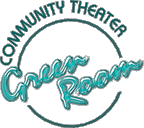|
||||||||||||||||||||||||||||||||||
Part 2 - Newspaper Ins and OutsBy Mike Polo |
The newspaper is a good, inexpensive way to get the word out… if used properly. Advertising is just one way to make the paper work for you. Remember press releases? Most papers have at least one person, full time, who does nothing but work with press releases. And then, of course, the highlight of a newspaper campaign - the news story. But let's start with the basics. Press ReleasesThere are certain essential things that have to be in a press release: who, what, when, where, how and how much. The first four are pretty obvious, as is the last; "how" is "how do I get more information (tickets, donate money, whatever). The trick is to make the release interesting enough to get published. In a press release publicizing a show, don't make the mistake of providing a plot synopsis. Tantalize, tease and generate interest. Use the play's exposition to your benefit. Ask questions: "Who poisoned the health resort owner? Who will be the next to die?" You get the idea. One cardinal sin here is to be dry: "A mystery set in a health club" has no punch whatsoever. So when should you send out press releases? Every chance you get.
The last three press releases should also include something else - good quality photographs. Black and white prints always go over well, although more and more papers are using more color. Check with the paper and see which they prefer. Paid AdvertisingPaid advertising can be cheaper than you think. Most papers will cut a non-profit a break. If they won't, you know what your schedule is, so you can probably buy in advance and get a break that way. The ad rep will be more than happy to show you how you can save a few pennies. Don't be afraid to ask questions. If you have a graphic designer who creates your programs and flyers, try to have them design your ad. It will give a more unified look to all your materials, and they will probably design something a little more eye-catching than the paper's in-house staff would do. If you do end up relying on the paper to do your layout, don't be afraid to speak up and tell them what you want. After all, you're paying for it. Don't see your ad for the first time when you pick it up off the sidewalk. If you can buy in more than one paper, do it. If you can't afford that, try to get an idea of which paper is most likely to do you the most good. We've had at lot of luck using the local weekly paper, rather than the daily. People seem to read it a little closer. We've built up quite a relationship over the years, and they come over and do a story on each show. News StoryWeekly papers are more likely to give you a story than the dailies. Weeklies have more room and tend to be more community-oriented than dailies. But it never hurts to ask. Follow up on your press releases by giving a call and inviting the paper to send a reporter. If you do end up being interviewed for a news story, remember three things: 1) talk as though everything you say will end up in the story, but not necessarily in the right order, 2) NOTHING you say is ever really "off the record"… that just looks good on TV, and 3) you will not get to approve the story before it is printed. Whole books have been written on the art of the interview, all of them full of great advice; "don't be rushed," " think over every answer," etc. The best advice in each of them is summed up above. Next TimeNext we'll look into one of my favorite topics: how to talk a radio station into promoting your show. That one's gonna be fun. |
|
The
Community Theater Green Room www.communitytheater.org © 1999 - 2007 Chris & Mike Polo All rights reserved. |


